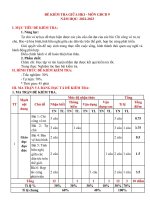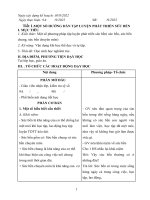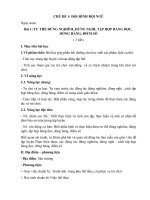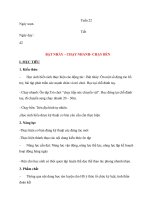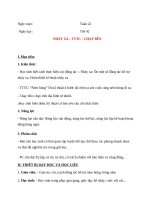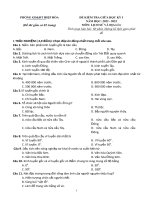simple compound complex sentence (word)
Bạn đang xem bản rút gọn của tài liệu. Xem và tải ngay bản đầy đủ của tài liệu tại đây (100.7 KB, 9 trang )
* Grammar:
I. Types of Sentence ( Các kiểu câu )
1. Câu đơn (Simple Sentence)
Câu đơn là gì? Câu đơn trong tiếng anh là câu ch ỉ có một mệnh đề độc lập.
(“Mệnh đề là 1 câu hồn chỉnh phải có chủ ngữ (S) và động từ (V)”)
E.g.: My hobby is horse-riding.
* Một câu đơn có thể có nhiều hơn một chủ ngữ
E.g.: John and Mary were sad.
* Một câu đơn có thể có nhiều động từ.
E.g.: Smith ate noodle and drank coffee.
2. Compound sentence:
Compound sentence là gì? Một câu ghép trong tiếng anh gồm hai mệnh đề
độc lập được nối với nhau bằng các liên từ nối hoặc các cặp t ừ n ối . Để xác
định liệu mệnh đề có phải là mệnh đề độc lập khơng ta lược bỏ liên t ừ đi.
E.g.: Smith ate noodle and John drank coffee.
→ Smith ate noodle (Mệnh đề độc lập)
→ John drank coffee. (Mệnh đề độc lập)
E.g.: Smith ate noodle and drank coffee.
→ Smith ate noodle (Mệnh đề độc lập)
→ drank coffee. (khơng phải là Mệnh đề vì khơng có chủ ngữ )
* Một câu ghép được kết nối bằng:
a) dấu phẩy, chấm phẩy hoặc dấu hai chấm.
E.g.: I met David yesterday; he’s just come out of hospital.
(Hôm qua tôi gặp David; anh ta vừa ra khỏi bệnh viện.)
b) liên từ kết hợp như: For, And, Nor, But, Or, Yet, So (FANBOYS) ….
1
3. Complex Sentences (câu phức)
- Có 1 mệnh đề độc lập (independent clause) và 1 hay nhiều mệnh đề phụ
(dependent clause)(nhưng thường là 1 mệnh đề phụ). Hai mệnh đề
thường được nối với nhau bởi dấu phẩy hoặc các liên từ phụ thuộc.
E.g.: When I came, they were watching TV.
We'll go out if the rain stops.
Một số liên từ phụ thuộc:
After,although,as,as if,as long as,as much as,as soon as,as though…….
4. Compound-Complex Sentences (hoặc Mixed Sentences) (câu phức
tổng hợp)
Là câu có ít nhất 2 mệnh đề chính và ít nhất 1 mệnh đề phụ
Ví dụ:
Although I like camping, I haven’t had the time to go lately, and I haven’t
found anyone to go with.
* Bảng liên từ và cách dùng
Coordinating
Conjunctions
(liên từ kết hợp) dùng
trong câu ghép
- and: và
- but : nhưng
- or : hoặc, nếu không
Correlative Conjunctions
(liên từ tương quan
- either...or: hoặc..hoặc..
I will either go for a walk or read
a book. (Hoặc tôi sẽ đi dạo hoặc
đọc sách)
E.g.: You should study
hard for this exam or you
can fail
- neither...nor: không…cũng
không….
(Bạn nên học chăm nếu
không bạn sẽ thi rớt)
Anh ta chăng giàu cũng chăng
nôi tiếng gì cả)
- nor: mà cũng khơng
- not only...but also: khơng những
…mà còn…
=> S + V (dạng phủ định) , nor +
auxiliary verb (trợ động
từ) + S + V
He is neither rich nor famous. (
She is not only clever, but
also beautiful. (Cô ta không
2
Subordinating
Conjunctions (liên từ phụ
thuộc) dùng trong câu
phức
after: sau khi
before: trước khi
although/though/ even
though: mặc dù
as long as: miễn là
as soon as: ngay khi
because /since/as: bởi vì
so that / in order that
: để mà
If: nếu
even if: kể cả khi
E.g.: She doesn’t like apple,
nor does she like banana.=
She doesn’t like apple and
she doesn’t like banana.
( Cơ ấy khơng thích táo
mà cũng khơng thích
chuối)
for : bởi vì
yet = but
so : vì vậy
những thơng minh mà cịn xinh
đep)
- both...and: vừa..vừa…
He is both intelligent and goodnatured. (Anh ta vừa thông minh
vừa tốt bụng)
unless: nếu không
until: cho đến khi
when/ as: khi
where: nơi
while: trong khi
- whether...or: liệu ….hay…
Have you decided whether you
will come or not? (Bạn đa quyết
định là liệu bạn có đến hay
khơng chưa?)
- scarcely…when = no sooner …
than: ngay khi…thì
I had scarcely walked in the
door when I got the call. (Ngay khi
vừa đi vào cửa thì tơi có cuộc gọi)
- would rather… than..: thà…còn
hơn..
I would rather go to the
cinema than go to the library. (Tôi
thà đi xem phim hơn là đến thư
viện)
* Lưu ý: trong cấu trúc với neither…nor và either…or, động từ chia theo
chủ ngữ gần nhất ; còn trong cấu trúc với both…and và not only …but
also, động từ chia theo chủ ngữ kép (là cả 2 danh từ trước đó.)
Ví dụ: Neither my mother nor I am going to attend his party. (cả me tôi
và tôi đều không tham gia bữa tiệc)
Both my mother and I are going to attend his party. (both my
mother and I = We) (Cả me tơi và tơi đều tham gia bữa tiệc)
•
Bài tập:
I. Hãy xác định đâu là câu đơn, câu ghép và câu ph ức trong 10 câu
tiếng Anh được liệt kê bên dưới.
1. The training rooms of these college athletes smell of grease and gasoline.
2. Their practice field is a stretch of asphalt, and their heroes make a living
driving cars.
3
3. Their tools are screwdrivers and spanners rather than basketballs and
footballs.
4. This new brand of college athlete is involved in the sport of auto racing.
5. Most of the students are engineering majors, and they devote every
minute of their spare time to their sport.
6. Although the sport is new, it has already attracted six collegiate teams in
the Southeast.
7. The students work on special cars designed for their sport.
8. The cars are called Legends cars, models of Fords and Chevys from 1932
to 1934, and they are refitted by the students with 1200 cc motorcycle
engines.
9. Although their usual speed ranges from 50 to 90 miles an hour, Legends
cars can move up to 100 miles an hour on a straightaway.
10. The Saturday morning races of the competing teams have attracted as
many as 3,500 fans, but the students concede they are no threat to the
nation's fastest growing sport of stock car racing.
II. 1. The Da Nang Interenational Fireworks Festival is very famous and
amazing; ....... , it has attracted thousands of foreign and domestic visitors.
A. therefore
B. because
C. while
2. School children like Tet because it is a long holiday; ........, they can also
receive a lot of lucky money on the occasion.
A. and
B. otherwise
C. moreover
3. ....... you have chance to visit Khanh Hoa, you should join Nha Trang Sea
Festival celebrated in June.
A. So
B. If
C. While
4. I went to Le Mat festival last year, ........ I didn't taste any snakes there.
A. and
B. but
C. or
5. The Kate festival is celebrated to commemorate the Cham heroes, ....... it's
also a chance for the local to relax and meet one another.
A. because
B. although
C. and
III. Nối câu với liên từ thích hợp:
neither … nor
but and so
either … or
1.People should not throw rubbish in the park. People should not cut down
the trees in the park.
=>
4
2. Mould and mildew can cause health problems. We need to remove any
growth regularly.
=>
3. For a start, we should use renewable resources. We should also consume
more organic food.
=>
4. Modern household appliances make our life more convenient. Some of
them are not eco-friendly and cause pollution.
=>
5. We should not waste paper. We should not cut down any trees either.
=>
IV. Sử dụng liên từ và câu dưới đây để tạo thành câu ph ức:
so that
we can reduce energy consumption and air
pollution
if
they are aware of their high exhaust emissions
because
we keep polluting our rivers, seas and oceans
when
this will help to save energy
although
black carbon particles are released into the air
1.We should use recycled materials .
=>
2.More and more aquatic animals will die .
=>
3.Levels of soot pollution increase .
=>
4. Some farmers still use old diesel trucks .
=>
5. We should walk or cycle more often
=>
.
IV. 1.The boys are playing games, ________ the girls are watching TV.
A. so
B. nor
C. and
2.I tried my best in the final test, ________ the result was not as good as I
expected.
A. but
B. so
C. for
3.He lost the key, ________he couldn't get into the house.
A. yet
B. or
C. so
4.She loves comedies, ________ her husband is interested in action films.
5
A. for
B. yet
C. or
5.You must do well in the test, ________ you will not graduate.
A. so
B. or
C. for
6. Pop music is so popular, ________ the melody is simple and memorable.
A. for
B. so
C. and
7. I should practice more for the competition, _________ my health hasn't
been excellent recently.
A. and
B. so
C. but
8. You can go to the movies with me, __________ you can go to the concert
alone.
A. and
B. or
C. so
V. 1.The boy didn't like to go to school. He went anyway.
A. The boy didn't like to go to school, so he went anyway.
B. The boy hated to go to school, yet he went anyway.
C. The boy hated to go to school, and he went anyway.
2. I am planning to visit Korea. I have started to save some money.
A. I am planning to visit Korea, but I have started to save some money.
B. I have a plan to visit Korea, nor have I started to save some money.
C. I have made a plan to visit Korea, so I have started to save some money.
3. The first season of Vietnam Idol aired on VTV in 2007. The fifth season
aired in 2013.
A. The first season of Vietnam Idol aired on VTV in 2007, and the fifth one
aired in 2013.
B. The first season of Vietnam Idol aired on VTV in 2007, but the fifth
season aired in 2013.
C. The first season of Vietnam Idol aired on VTV in 2007, for the fifth season
aired in 2013.
4.My uncle can play volleyball. He can't play basketball.
A. My uncle can play football, so he can play basketball.
B. My uncle can play volleyball, nor can he play basketball.
C. My uncle can play volleyball, but he can't play basketball.
5.Let's go to the swimming pool. It's so hot today.
A. Let's go to the swimming pool, for it's so hot today.
6
B. Let's go to the swimming pool, so it's very hot today.
C. Let's go to the swimming pool, and it's so hot today.
6. You can call the manager directly. You can email him.
A. You can call the manager directly, or you can email him.
B. You can call the manager directly, for you can email him.
C. You can email the manager, so you can call him directly.
7.She sang beautifully. At the end of her performance, she got a big round of
applause from the audience.
A. She sang beautifully, yet at the end of her performance, she got a big
round of applause from the audience.
B. She sang beautifully, for at the end of her performance, she got a big
round of applause from the audience.
C. She sang beautifully, so at the end of her performance, she got a big
round of applause from the audience.
8. It is raining very hard. The children are still playing football.
A. It is raining very hard, for the children are still playing football.
B. It is raining very hard, yet the children are still playing football.
C. It's raining very hard, so the children are still playing football.
VI. Compound Sentences - Xác định câu Đúng hay Sai.
Decide whether the following sentences are Correct or Incorrect.
(Xác định những câu sau là đúng (Correct) hay sai (Incorrect))
1. He was a gifted song-writer, but he had to suffer poor health.
Correct
Incorrect
2. Katherine doesn't like the main characters of that movie, nor she likes its
plot.
Correct
Incorrect
3. Pitt has just put two new batteries in the toy car, yet it is not running.
Correct
Incorrect
4. Mary was tired, yet we stopped for a rest.
Correct
Incorrect
5. Maybe it is caused by human error, and maybe it is totally a coincidence.
Correct
Incorrect
6. You've been waiting for too long. You should go home, and I will ask Sally
to talk to you later.
Correct
Incorrect
7
7. I stayed in San Francisco for two years, so that I can recommend some
really nice sites.
Correct
Incorrect
8. Because my mother is busy this week, so my father is going to my
cousin's wedding.
Correct
Incorrect
VII. Compound Sentences - Điền liên từ phù hợp vào ch ỗ trống.
Fill in the blanks with coordinating conjunctions: and, or, but, so, yet,
for, nor
1. Daniel tried to read a book in Thai,
…………………… it was too difficult.
2. Will you pick me up after work, ……………………….. will I take the bus?
3. My grandfather is quite old, ………… he exercises more regularly than I do.
4. My holiday will be an all-inclusive one, ……………….. I don't know much
about the city.
5. Did he design the house himself, ……………… did he have it designed by an
architect?
6. My mother gave me some money, …………….. she also gave me a new dress
for Tet.
7. She never came to see him, ……………….. did she leave him any money.
8. I had failed the driving test once, ……………. I was very nervous yesterday.
VIII: Tìm từ sai hoặc thừa trong mỗi câu.
Determine ONE wrong/ redundant word in each sentence.
(Xác định MỘT từ sai/ thừa trong mỗi câu sau.)
1.She doesn't like the car toy, nor does she likes the Teddy bear.
2.There were no online tickets left, so that we had to come to the box office.
3.Turn off all the lights and the TV, or lock the door before you leave.
4.She'd like to know what her mistakes are, so she wants to improve her pr
onunciation.
5.For this computer is broken, and you can use that tablet.
6.That man looks like a kind guy you can count on, and he isn't. He always
gives others a hand if he can.
7.You mustn't go to the box office to buy tickets, for they don't sell tickets
online.
8.The actor has been nominated for 10 Grammy Awards, yet he has won eig
ht. That's a greatachievement.
II. Relative clause with which
Complete the following sentences using “which” and the words given.
Change the word forms or add some words if necessary.
8
1. some businesses and people / been environmentally irresponsible /
lead / global warming / climate change
=>
2.green technology / use renewable resources / create / eco-friendly /
products
=>
3.climate changes / affect crop harvests / cause / global / local / food
shortages
=>
4.environmental pollution / put some species / danger of extinction / affect
/ species diversity / Earth
=>
5.everybody / should make an effort / go green / help / save / planet /
future generations
9
